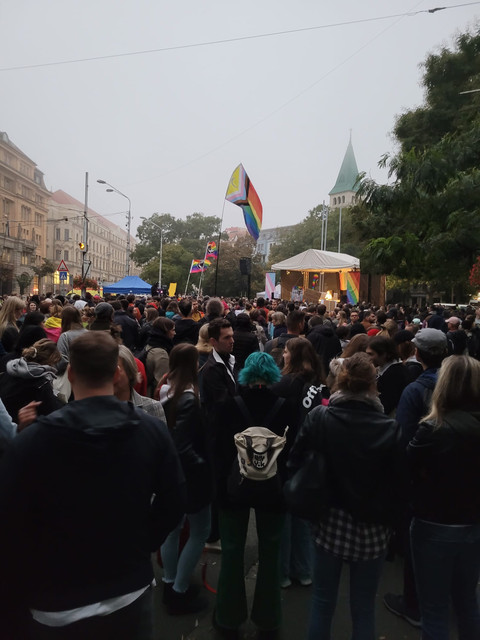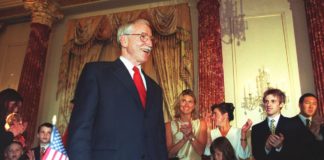Despite the immediate shock and outburst of solidarity after the recent terrorist attack by a 19-year-old sympathiser of far-right conspiracies, Slovak society appears to be absorbed in even deeper ideological divisions on issues related to gender and sexual orientation.
Two young men were shot dead and a woman was injured on 12 October while sitting at a table outside a gay bar on Zamocka Street in the capital, Bratislava, with the perpetrator escaping the scene and shooting himself early the next morning.
Before his suicide, the teenager revealed what he had done and claimed to have no regrets on his Twitter account.
He also published his motives in a 65-page manifesto, inspired by foreign extremist sites and social networks, expressing racist views and hatred against Jews, the LGBTI community and the existing political institutions.
Several Slovak politicians, including prime minister Eduard Heger, were on his list of “high-value” targets.
Lost for (right) words
The murder sparked a strong reaction among the Slovak public, thousands attended the marches against the violence and in support of the LGBTI community.
But the country’s leading politicians apparently struggled in communicating the subject — in the face of a predominantly conservative and highly-polarised population, under the relatively strong influence of the Catholic Church.
Heger, of the ruling conservative OLaNO (Ordinary People and Independent Personalities) party, himself apologised under public pressure for his initial “choice of words” in a Facebook status in which he claimed nobody should be attacked for their “way of life.”
“It is absolutely unacceptable in a free and democratic country for people to die or be attacked because of their sexual orientation, race, sex or faith,” stated the revised version.
Heger also announced the ministry of justice had been tasked to prepare legislation tackling the problems in the practical life of the LGBTI community, such as the property rights of same-sex couples.
Slovakia is one of six EU member states that do not offer any legal recognition to same-sex relationships, along with Bulgaria, Latvia, Lithuania, Poland and Romania.
However, OLaNO leader and finance minister Igor Matovic ruled out approval of a registered partnership as part of the move, stressing it would go beyond the Slovak government manifesto.
In September, the liberal Freedom and Solidarity (SaS) party quit the ruling coalition. The three-remaining centre-right parties of the minority government — OLaNO, We are Family party and For the People party are largely conservative-leaning.
Most opposition parties also express conservative views, including the Smer-SD social democrat party, a member of the Socialists & Democrats group in the European Parliament.
“They know their voters and will not part with attitudes that win them those votes,” Michal Cirner of the department of theory of politics at the University of Prešov told EUobserver.
“Most of their supporters do not want to see major shifts or gestures toward the LGBTI+ community — so the minimum changes, with no fanfare, should be expected. There may be eventually some progress as we live in the 21st century but hardly anything crucial or provocative toward the conservative majority,” Cirner said.
Deeper still in the trenches
According to the 2019 Eurobarometer, 31 percent of Slovaks agreed that gay, lesbian and bisexual people should have the same rights as heterosexual people, the lowest share in the EU.
The Zamocka Street shooting could affect some of their perspectives on the subject, argues the sociologist Michal Vašečka, of the faculty of media, the Pan-European University in Bratislava.
Liberal-minded Slovaks view the tragedy as proof that their country has failed to protect the rights of all its citizens and needs to act on it, while some others were shocked about the intensity of the problem, Vašečka said.
On the conservative side, he added, some who agree with protecting human rights but do not consider LGBTI rights as part of the package have started actively defending their view — while the more radicalised and conspiracy-driven parts of the population seem even more united in targeting the queer community as their key enemy.
“Conservative groups tend to accuse the liberals and generally the West of pushing forward what they call the sick agenda against human nature,” Vašečka noted.
“Ultimately, there is pressure for everyone to take sides with one of the two broader opinion camps, the trenches become deeper, and things become dangerous because black-and-white views proceed from hatred to conflicts…as ever in history.”
As a member of the European Commission against Racism and Intolerance (ECRI) established by the Strasbourg-based Council of Europe, Vašečka pointed out that it has been one of the key recommendations for Slovakia to improve the situation of the LGBTI community — but to little or no effect.
“What might eventually work with some people is the economic point”, he said (adding that this is his least-favourite argument.)
“Not a small number of Slovaks are leaving their homeland due to the quality of life of the LGBTI community, and foreign firms consider the matter before deciding to come and invest in Slovakia,” Vašečka stated.
EU law does not oblige member states to adopt the same rules on same-sex unions but discrimination on sexual orientation grounds is prohibited.
But amid the ideological debates after the shooting, a Slovak regional court ruled that a same-sex couple, wedded in Argentina, should have been granted the same permanent residence as it applies to married couples — rejecting a decision by the Slovak foreigners’ police as discriminatory.









